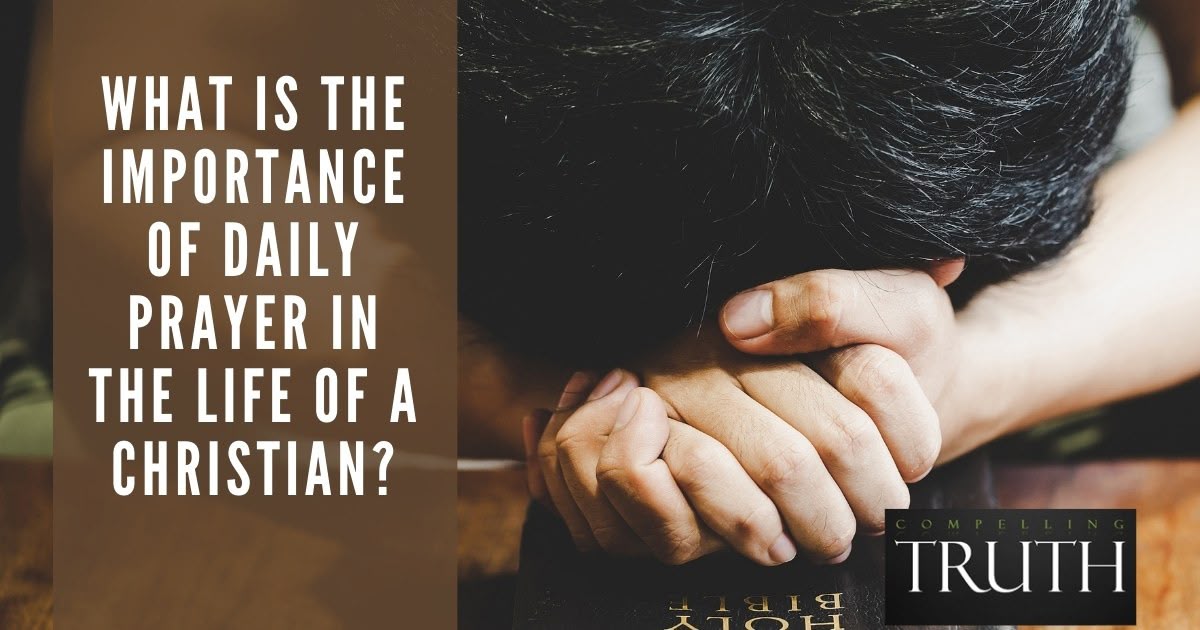In 1 Thessalonians 5:15–18, Paul writes, "See that no one repays anyone evil for evil, but always seek to do good to one another and to everyone. Rejoice always, pray without ceasing, give thanks in all circumstances; for this is the will of God in Christ Jesus for you." Paul's commands here are paired with several others; these are actions and attitudes that exemplify the life of the Christian.
To help us understand what it means to "pray without ceasing," we'll look at the specific term Paul uses here and then explore the concept as it is found elsewhere in Scripture. The Greek word translated as "without ceasing" is ἀδιαλείπτως (adialeiptōs) which means without intermission, incessantly, or with great care and perseverance. In other words, Paul is saying that we should be in constant prayer. Paul uses this phrase four different times in Scripture, three of them in this letter to the Thessalonians (1 Thessalonians 1:2–3; 2:13; 5:17). Paul told the Thessalonians that he and his fellow workers (Silvanus and Timothy) remember the Thessalonians' "work of faith" and "labor of love" without ceasing (1 Thessalonians 1:3). He later says that they thank God "constantly" because the Thessalonians received the gospel as the true word of God (1 Thessalonians 2:13). He writes to the church in Rome, "For God is my witness, whom I serve with my spirit in the gospel of his Son, that without ceasing I mention you always in my prayers" (Romans 1:9–10a).
Similar exhortations regarding the constancy of prayer are throughout the New Testament. In Luke 21 Jesus reminds His disciples to remain vigilant, lest they be "weighed down" with the cares of life. He told them to "stay awake at all times [metaphorically speaking], praying that you may have strength" (Luke 21:34–36). Luke 18:1 says Jesus told His followers "a parable to the effect that they ought always to pray and not lose heart." In Acts we read of the company of disciples returning to Jerusalem after Jesus' ascension; they gathered together and "All these with one accord were devoting themselves to prayer, together with the women and Mary the mother of Jesus, and his brothers" (Acts 1:14). In Romans 12:12 Paul writes, "Rejoice in hope, be patient in tribulation, be constant in prayer." Paul told the church in Ephesus to be "praying at all times in the Spirit, with all prayer and supplication" (Ephesians 6:18). He counseled the Philippians not to worry about anything and to pray about everything (Philippians 4:6). In Colossians 4:2 Paul writes, "Continue steadfastly in prayer." The New Testament is replete with mentions of people praying, commands to pray, and examples of prayer.
All throughout Scripture we read of men and women praying to God. They prayed for forgiveness (Daniel 9:20), for restoration (Nehemiah 1:4–11), for healing (Genesis 20:17), for childbirth (Genesis 25:21); they prayed when they were in distress (1 Samuel 1:10) and when they had joy (1 Samuel 2:1–10). Prayer is one of our primary means of communication with God. It is an opportunity to speak with the Creator of the universe and be heard (e.g., Jeremiah 29:12–13; Psalm 66:17–20; Hebrews 4:14–16; 1 Peter 3:12; 1 John 5:15).
When Paul exhorts the Thessalonians to "pray without ceasing" he is encouraging them, and by extension us, to always be in prayer, seeking God's counsel and wisdom in every aspect of our lives. Notice that the command to "pray without ceasing" is surrounded by the concepts of rejoicing and giving thanks. Prayer is not just about us gaining wisdom or making requests, it also includes worshipping and praising God. The idea being conveyed here is a heart attitude and posture of prayer, not a command to be seated with head bowed and eyes closed all day. Rather we are to live in continuous prayer as we live our lives in continual awareness of God and surrender to Him. We will communicate with Him throughout our days, knowing that if we are in Christ, His Holy Spirit lives inside us and we have continual access to God through prayer.
Times of dedicated and focused prayer are certainly needful and beneficial. Jesus "would withdraw to desolate places and pray" (Luke 5:16), setting the example for us. But to pray without ceasing, we pray more than just in these set aside times. When we notice the beauty of creation or the kindness of a stranger, when we are made aware of a need in our lives or those of others, when we have a decision to make or are in the midst of a discussion, when we sit down to a meal, when we lay down for bed or rise up in the morning, when we prepare for work or find our tasks at work challenging or unfulfilling or joyous, when we disagree with our spouse or are frustrated with our children, when we feel energetic or when we feel sick, when we decide on a television show to watch or a book to read, in all things that we do, at all times, in all circumstances, for all reasons, we can commune with God in prayer.
When we pray without ceasing, we are acknowledging that our life belongs to the one who gave His own life to preserve ours, and turning over our will and our desires to Him (Matthew 26:36–46; Romans 8:26–30; 1 Peter 5:6–7; 1 John 5:14–15). We are fully engaging in the privilege of relationship with the one who knows us completely, loves us with perfect love, and transforms us into His image. We are acknowledging spiritual realities and living our lives intentionally in God's presence, longing for the day we will be complete in Him (1 Corinthians 13:8–13; Hebrews 10:19–23).
To help us understand what it means to "pray without ceasing," we'll look at the specific term Paul uses here and then explore the concept as it is found elsewhere in Scripture. The Greek word translated as "without ceasing" is ἀδιαλείπτως (adialeiptōs) which means without intermission, incessantly, or with great care and perseverance. In other words, Paul is saying that we should be in constant prayer. Paul uses this phrase four different times in Scripture, three of them in this letter to the Thessalonians (1 Thessalonians 1:2–3; 2:13; 5:17). Paul told the Thessalonians that he and his fellow workers (Silvanus and Timothy) remember the Thessalonians' "work of faith" and "labor of love" without ceasing (1 Thessalonians 1:3). He later says that they thank God "constantly" because the Thessalonians received the gospel as the true word of God (1 Thessalonians 2:13). He writes to the church in Rome, "For God is my witness, whom I serve with my spirit in the gospel of his Son, that without ceasing I mention you always in my prayers" (Romans 1:9–10a).
Similar exhortations regarding the constancy of prayer are throughout the New Testament. In Luke 21 Jesus reminds His disciples to remain vigilant, lest they be "weighed down" with the cares of life. He told them to "stay awake at all times [metaphorically speaking], praying that you may have strength" (Luke 21:34–36). Luke 18:1 says Jesus told His followers "a parable to the effect that they ought always to pray and not lose heart." In Acts we read of the company of disciples returning to Jerusalem after Jesus' ascension; they gathered together and "All these with one accord were devoting themselves to prayer, together with the women and Mary the mother of Jesus, and his brothers" (Acts 1:14). In Romans 12:12 Paul writes, "Rejoice in hope, be patient in tribulation, be constant in prayer." Paul told the church in Ephesus to be "praying at all times in the Spirit, with all prayer and supplication" (Ephesians 6:18). He counseled the Philippians not to worry about anything and to pray about everything (Philippians 4:6). In Colossians 4:2 Paul writes, "Continue steadfastly in prayer." The New Testament is replete with mentions of people praying, commands to pray, and examples of prayer.
All throughout Scripture we read of men and women praying to God. They prayed for forgiveness (Daniel 9:20), for restoration (Nehemiah 1:4–11), for healing (Genesis 20:17), for childbirth (Genesis 25:21); they prayed when they were in distress (1 Samuel 1:10) and when they had joy (1 Samuel 2:1–10). Prayer is one of our primary means of communication with God. It is an opportunity to speak with the Creator of the universe and be heard (e.g., Jeremiah 29:12–13; Psalm 66:17–20; Hebrews 4:14–16; 1 Peter 3:12; 1 John 5:15).
When Paul exhorts the Thessalonians to "pray without ceasing" he is encouraging them, and by extension us, to always be in prayer, seeking God's counsel and wisdom in every aspect of our lives. Notice that the command to "pray without ceasing" is surrounded by the concepts of rejoicing and giving thanks. Prayer is not just about us gaining wisdom or making requests, it also includes worshipping and praising God. The idea being conveyed here is a heart attitude and posture of prayer, not a command to be seated with head bowed and eyes closed all day. Rather we are to live in continuous prayer as we live our lives in continual awareness of God and surrender to Him. We will communicate with Him throughout our days, knowing that if we are in Christ, His Holy Spirit lives inside us and we have continual access to God through prayer.
Times of dedicated and focused prayer are certainly needful and beneficial. Jesus "would withdraw to desolate places and pray" (Luke 5:16), setting the example for us. But to pray without ceasing, we pray more than just in these set aside times. When we notice the beauty of creation or the kindness of a stranger, when we are made aware of a need in our lives or those of others, when we have a decision to make or are in the midst of a discussion, when we sit down to a meal, when we lay down for bed or rise up in the morning, when we prepare for work or find our tasks at work challenging or unfulfilling or joyous, when we disagree with our spouse or are frustrated with our children, when we feel energetic or when we feel sick, when we decide on a television show to watch or a book to read, in all things that we do, at all times, in all circumstances, for all reasons, we can commune with God in prayer.
When we pray without ceasing, we are acknowledging that our life belongs to the one who gave His own life to preserve ours, and turning over our will and our desires to Him (Matthew 26:36–46; Romans 8:26–30; 1 Peter 5:6–7; 1 John 5:14–15). We are fully engaging in the privilege of relationship with the one who knows us completely, loves us with perfect love, and transforms us into His image. We are acknowledging spiritual realities and living our lives intentionally in God's presence, longing for the day we will be complete in Him (1 Corinthians 13:8–13; Hebrews 10:19–23).



